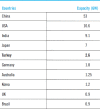Within the global circular economy: A special case of Turkey towards energy transition
- PMID: 38624537
- PMCID: PMC7849225
- DOI: 10.1557/mre.2020.26
Within the global circular economy: A special case of Turkey towards energy transition
Abstract
Circular energy transformation of Turkey is essential to strengthen the national energy security. Turkey will benefit from moving towards a circular economy. Circular economy (CE) has gained much attention due to global warming and climate change which are the most serious issues faced in the world. The United Nations has been struggling with the issues regarding sustainable development by releasing some programs and legislations, which are mostly supported by the EU. The EU's CE including both economy and energy within the scope of low-carbon world is binding for Turkey's energy transition. Among renewables, solar energy preserved the leading capacity expansion with an increase of 98 GW in 2019 in the world. Solar photovoltaic (PV) has become a mainstream energy source among renewables. Since the PV installation has been growing all around the world, several countries especially China, Germany, and the UK pay special attention to a sustainable PV waste management concept. We present the special case of Turkey within the global CE along with the current status of renewable energy in the global energy transformation. Turkey's energy outlook and the EU's targets are reviewed, and the significant role of solar energy in the CE transition process of Turkey has been revealed. We suggested adding a vision of "More Circular" to her new energy policy "More Domestic, More Renewable."
Keywords: economics; energy generation; environmentally protective; photovoltaic; recycling.
© The Materials Research Society 2020.
Figures







References
-
- Ellen MacArthur Foundation: Completing the Picture: How the Circular Economy Tackles Climate Change, 2019. Available at: www.ellenmacarthurfoundation.org/publications/completing-the-picture-cli... (accessed May 29, 2020).
-
- World Business Council for Sustainable Development: Climate Action and Policy. Available at: https://www.wbcsd.org/Programs/Climate-and-Energy/Climate/Climate-Action... (accessed May 28, 2020).
-
- Kuznets S.: Economic growth and income inequality. Am. Econ. Rev. 49, 1–28 (1955).
-
- Stern D.I.: The rise and fall of the environmental Kuznets Curve. World Dev. 32(8), 1419–1439, (2004).
-
- The International Bank for Reconstruction and Development (IBRD): World Development Report 1992. Development and the Environment (Oxford University Press, 1992), New York.
Publication types
LinkOut - more resources
Full Text Sources
